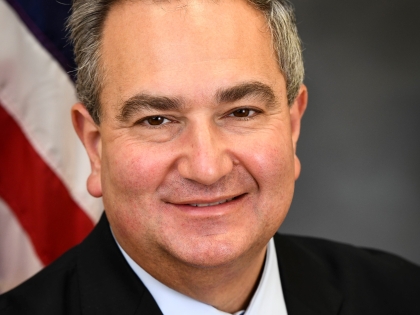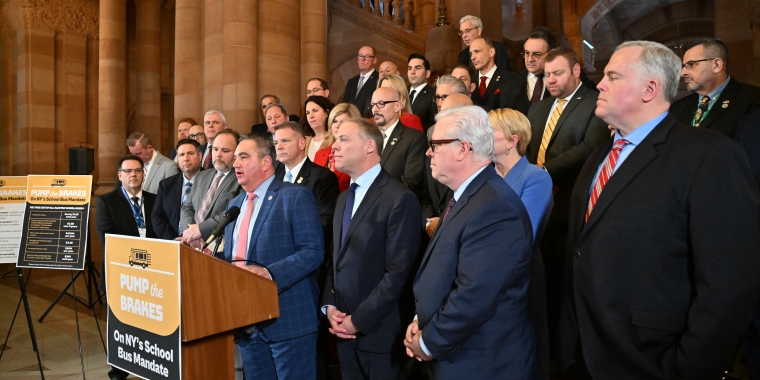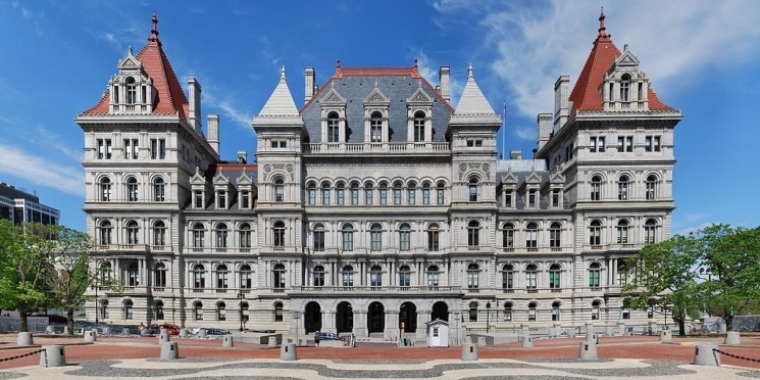
Senate and Assembly Republicans Joined by School Officials in Calling 2027 Electric Bus Mandate ‘Unworkable’ and Proposing Alternatives
February 13, 2024

the costs that would fall on the taxpayer
ALBANY, NY – Republican members of the New York Senate and Assembly were joined by officials from New York’s education community in calling on Governor Hochul and the Legislature’s Democratic majorities to pause the 2027 statewide implementation of the electric school bus mandate to allow for the completion of a pilot program, cost-benefit analysis and other feasibility assessments.
The electric school bus mandate, enacted in 2022, requires new school bus purchases to be zero emission by 2027 and all school buses in operation to be electric by 2035. There is no provision made for the geographical disparities, diverse weather conditions or unique travel demands of the state’s school districts. In addition, this is another mandate from Albany that burdens cash strapped school districts and taxpayers.
“As the 2027 implementation date of New York’s electric bus mandate approaches, school officials in my district and around the state are becoming increasingly concerned about the tremendous financial and operational challenges associated with this one-size-fits-all requirement,” said Senator George Borrello, SD57.
“This mandated conversion will have a price tag in the billions, with New York State taxpayers simply expected to foot the bill. said Sen. Borrello. “Like so much of the state’s climate agenda, there is no cost-benefit analysis of this mandate or any realistic plan for how to pay for it.”
“Electric buses cost up to three times as much as conventional buses -- it’s a difference of $130,000 versus $400,000-$450,000. Additionally, electrical infrastructure and distribution line upgrades can add hundreds of thousands of dollars or more. The conversion cost has been conservatively estimated at between $8 billion and $15.25 billion more than the cost of replacing them with new diesel buses. However, the multi-million dollar estimates utilities are now providing to some school districts just for the electrical upgrades suggests the total costs will be much higher than $15 billion,” said Sen. Borrello.
“The EV school bus mandate is the Mother of all unfunded state mandates. At a time when our state is bleeding billions of dollars because of the migrant crisis and school aid cuts are hitting rural and suburban districts, neither our schools nor our taxpayers can shoulder crushing new costs,” said Assemblyman Phil Palmesano, AD 132.
He noted the state allocated just $500 million in the most recent Environmental Bond Act to assist schools with the conversion costs of the state’s 50,000 buses.
Assemblyman Palmesano and Senator Thomas O’Mara are sponsoring legislation that would, among other things, require the Commissioner of Education to complete a cost-benefit analysis for each school district that takes into account the costs necessary to comply with the zero-emission school bus mandate.
Legislators cited other problems associated with electric vehicles that are gaining increasing attention and adding to concerns about investing taxpayer funds in the conversion. Those problems include:
- Inability to operate or charge in frigid temperatures, as a well-publicized incident in Chicago in mid-January underscored. Designed to operate best in 70-degree temperatures, electric vehicles lose up to 40 percent of their traveling range in extreme cold and the time required to charge them is much longer. A pilot program in Vermont found traveling range decreased by 80 percent in some instances;
- Poor reliability. School districts engaged in pilot programs and agencies operating municipal buses have reported many electric buses are “gathering dust” in bus garages as a result of numerous mechanical problems and hard to access parts and technical support. A study by Consumer Reports found that electric vehicles have 80 percent more problems than conventional vehicles.
“While many states around the nation are wisely testing the feasibility of electric buses for their regions through pilot programs, New York Democrats rushed to enact a mandate without any firsthand data on whether it would meet the needs of our districts. This is a movie we’ve seen before in Albany and it never ends well,” said Senator Borrello.
He noted that he is proposing legislation, Senate Bill 8467, that would rescind the mandate and replace it with a state-funded pilot program that would allow schools to test how these buses perform. A condition of the pilot program is that buses be sited in all three types of settings, rural, urban and suburban, so that their performance can be evaluated. At the end of one year, a report on the program would be presented to the executive and legislature.
“The zero-emission bus mandate for schools is at present unworkable and fiscally catastrophic for rural schools. While the goal is laudable, issues with feasibility of the vehicles, capacity of the power grid and fiscal commitment by the state all currently prevent compliance. The proposed legislation is a common sense approach that will answer the needed questions prior to making promises neither the state nor the industry can keep,” said David Little, Executive Director of the Rural Schools Association.
“The goal of having several clean energy options is a good one, but it’s got to be done with common sense and in a realistic way that’s reasonable and affordable for taxpayers, our local governments, and school districts and not add to the high tax burden faced by New Yorkers. We’re offering a reasonable proposal to rescind the electric school bus mandate that will cost school districts in New York State billions of dollars, and replace it with a state-funded pilot program that enables school districts to test and evaluate how these electric buses perform,” said Senator Jim Tedisco, Ranking Member on the Senate Education Committee.
“Rural, upstate schools need more funding to focus on educational services, not an expensive mandate that would raise taxes and divert resources away from students,” said Senator Dan Stec, Ranking Member on the Senate Environmental Conservation Committee. “Green initiatives are laudable, but the electric bus mandate runs counter to the realities our schools face. I’ve heard repeatedly from school superintendents that it simply isn’t feasible. Instead of punishing our schools with an expensive mandate for buses that may prove unreliable, let’s take a step back and replace it with a pilot program that would evaluate the efficacy of electric buses statewide.”
"Many of us believe that the Albany Democrats’ current plan for imposing far-reaching renewable energy mandates on all New Yorkers is not feasible, affordable, or reliable. This is particularly true for local school districts being mandated to transition to all-electric school buses beginning in 2027. The current timeline raises far too many troubling questions on affordability, as well as surrounding reliability and safety for student transportation. We know that the existing plan comes with an enormous price tag for local schools. For already overburdened local property taxpayers, it’s emerging as yet another hard hit from yet another unfunded state mandate out of Albany. We are moving too far, too fast on this transition. The technology is simply not there yet. The electric grid can't support it and the necessary charging equipment and buses which are not produced in sufficient quantities will get less expensive as the industry advances from its infancy. Further, urban settings where this may be more feasible, and where congestion and emissions are greater, should be going first. It seems reasonable and fair to reassess and reexamine the current timeline and its potential impact on school districts, students and families, and local communities,” said Senator Tom O’Mara, 58th Senate District.
“School districts across New York are already struggling under the weight of excessive state mandates, yet Albany Democrats always seem to find new ways to add to their burden. In my rural senate district, where bus routes can take hours to complete, it is unreasonable to force schools to move forward with untested electric buses that may not be up to the demands. Add on top of that the cost, at a time when many districts are struggling to stay afloat, and we are looking at an entirely unworkable proposal. Senator Borrello’s legislation calling for a pilot program, rather than another Albany mandate, is the best solution,” said Senator Peter Oberacker, 51st Senate District.
“My local schools are raising the alarm about this mandate and we should listen to them. It’s unrealistic, uninformed and irresponsible. Districts are planning now for how to implement and afford it, with little guidance or funding from the state. We’re talking upwards of $400,000 for just one bus, plus more for the needed infrastructure, not to mention whether our electric grid has the necessary capacity. I want to do everything we can to protect our environment, but this mandate is impractical. Let’s be smart about this and let’s protect our students, schools and property taxpayers,” said Senator Pam Helming, 54th Senate District.
“These proposals are each common-sense alternatives that would determine if an electric school bus mandate is affordable, reliable and, most importantly, feasible. Our school children should not be used as the test subjects for this costly and risky mandate,” said Senator Borrello.
###



